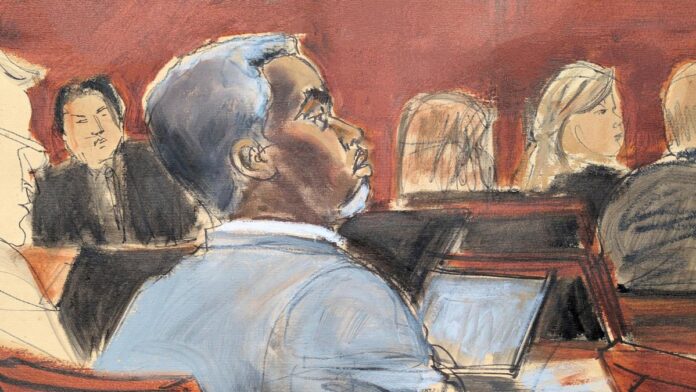Sean “Diddy” Combs’ Trial: A Closer Look at the Testimony of Ex-Girlfriend “Jane”
The Setting of the Trial
In a high-profile trial that has captured public attention, Sean “Diddy” Combs faces serious allegations of running a racketeering enterprise, enabling him to abuse women over two decades. The stakes are incredibly high, with potential penalties ranging from 15 years to life imprisonment if he is convicted. As the trial unfolds, the chilling testimonies from women who have come forward shed light on the controversial lifestyle of the hip-hop mogul.
“Jane” Takes the Stand
On a recent Friday, a woman, identified only by the pseudonym “Jane,” sobbed while recounting her traumatic experiences with Combs. Her emotional testimony spanned two days in court, revealing disturbing details about their drug-fueled encounters. Jane spoke candidly about how she felt ignored when she subtly signaled her desire to stop certain illicit activities, a theme that has surfaced throughout the trial.
Coercion and Ignored Signals
Jane described her relationship with Combs as a rollercoaster of highs and lows, punctuated by moments of despair. She expressed that when she verbally or non-verbally communicated her need to stop, Combs dismissed her cues, often insisting she “finish strong." This disturbing dynamic raises questions about consent and the complexities of their relationship, where Jane felt unable to assert her true feelings directly.
“I just, I don’t know,” she said through tears when asked why she didn’t simply tell Combs she wanted to stop. Her reluctance hints at an intricate web of emotional and psychological manipulation at play.
Echoes of Previous Testimonies
Jane’s account is strikingly similar to that of another former partner, R&B singer Casandra “Cassie” Ventura. Ventura’s testimony has also detailed instances of coercion and abuse, suggesting a troubling pattern in Combs’ relationships with women. Both women described coerced encounters with male sex workers, with Combs present, a practice Jane referred to as “hotel nights.” Each term used reflects a veneer of normalcy over deeply unsettling actions.
Financial Dependence and Fear
As the trial continues, the prosecution aims to highlight how Combs leveraged his wealth to manipulate women. Jane revealed that by September 2023, Combs had been covering her rent for about five months, which led to a palpable fear of losing financial security if she chose to extricate herself from these encounters. When asked about her fears, she admitted, “That he would take it away, that Sean would take the house away.” This admission underscores the power imbalance in their relationship.
The Role of Drugs
Substance use compounded the complexities of Jane’s experiences. During one episode, she recounted how she blacked out after taking ecstasy—a drug she claimed Combs provided. Following a series of degrading encounters, she even became physically unwell, feeling severe repulsion yet feeling compelled to continue as Combs encouraged her recovery in a dismissive manner: “that’s good. You’ll feel better now that you’ve thrown up.”
The Contrast of Love and Pain
Despite the darkness that encased their relationship, Jane’s feelings towards Combs reveal a contradictory tension. She recounted moments of genuine affection, telling jurors that she fought to block out feelings of sadness, trying to find joy in their time together. “I would really fight to block out how sad I was after,” she testified, revealing a complicated emotional landscape where love intertwined with confusion and distress.
In 2023, Jane sent Combs a text, expressing a longing to return to the happier beginnings of their relationship, a stark contrast to how it had devolved. “I don’t want to keep feeling like that,” she wrote, seeking adult discussions about their future. Combs’ dismissive response—“Girl, stop”—seemed to further underline the emotional chasm between them.
The Complexity of Relationships
The ongoing trial doesn’t merely bring the actions of Sean Combs into the spotlight; it also highlights the intricate, often messy nature of relationships entangled in fame, power, and dependency. As “Jane” continues her testimony, her story resonates with many, igniting conversations about consent, emotional manipulation, and the darker sides of celebrity life.
The proceedings serve as a stark reminder of the complexities that can arise when love, power, and substance abuse intertwine, leaving a path of emotional devastation. As the trial progresses, spectators are left to ponder the implications of the narratives being shared—narratives that reflect a much larger societal issue surrounding abuse, coercion, and the quest for autonomy.
